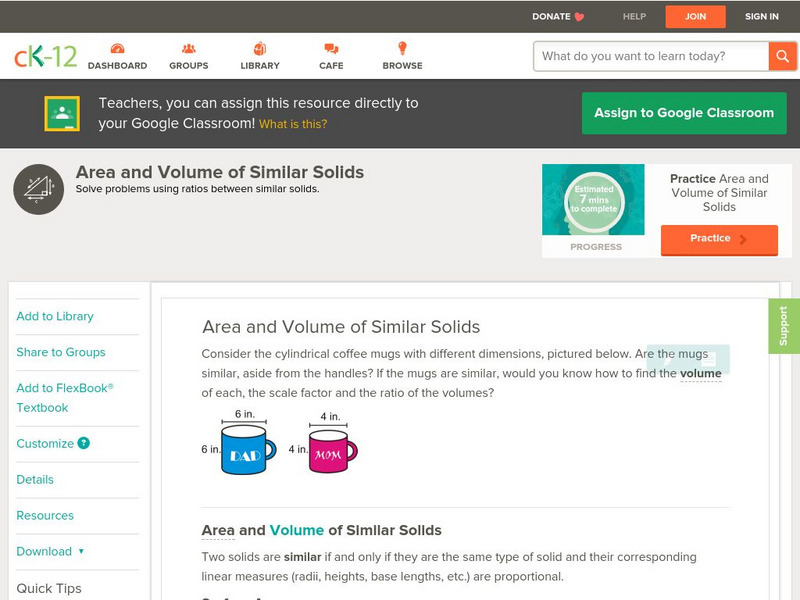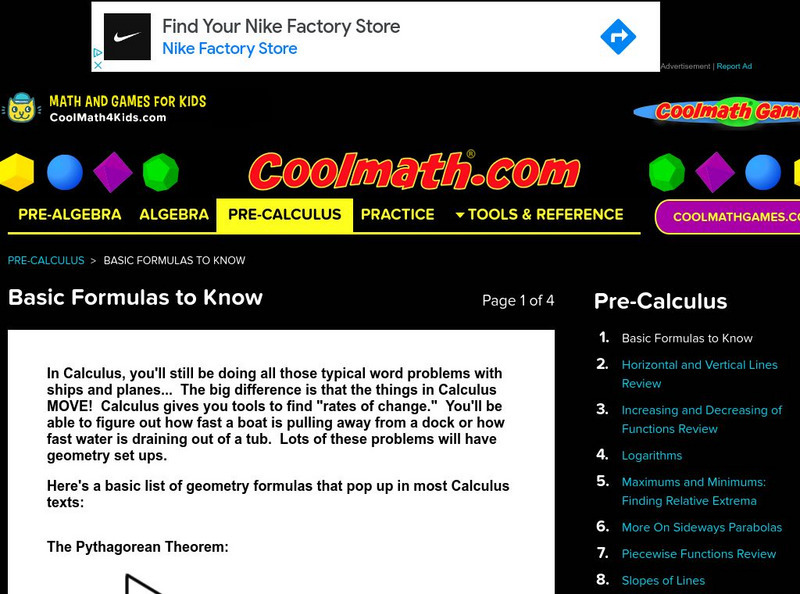CK-12 Foundation
Ck 12: Geometry: Area and Volume of Similar Solids
[Free Registration/Login may be required to access all resource tools.] This concept teaches students to use ratios between similar solids to solve for missing information. Students examine guided notes, review guided practice, watch...
CK-12 Foundation
Ck 12: Geometry: Surface Area and Volume of Prisms
[Free Registration/Login may be required to access all resource tools.] This concept teaches students how to calculate the surface area and volume of prisms.
Alabama Learning Exchange
Alex: How Big Can a Bee Be?
Students will study the relationship between surface area and volume. Math, science, and technology components are included.
Alabama Learning Exchange
Alex: Mentos, Soda, and Nucleation
In this lesson, Mentos candy and different types of soda are used to show examples of nucleation, surface tension, surface area, polar attractions, and supersaturated materials. A video will be used to show the examples and the students...
Better Lesson
Better Lesson: Geometry Assessment
Sixth graders solve real-world and mathematical problems involving area, volume and surface area.
Stanford University
Stanford University: Bubbling Tablets
Students learn how material properties change as the size of the material decreases to the nanoscale. This experiment investigates the effects of surface area on reaction rates.
Cool Math
Coolmath: Precalculus Basic Formulas to Know
This CoolMath resource provides an introduction to some Precalculus formulas.
Better Lesson
Better Lesson: Creating a Robot (2 Days)
What do tin foil, surface area, and rectangular prisms make? A tin foil robot of course! This activity includes practice problems about surface area, worksheets, a video explanation, and a reflection sheet.
Better Lesson
Better Lesson: Covering and Filling: Surface Area & Volume of Rectangular Prisms
Students apply their knowledge of surface area and volume to solve some problems for a box company. This lesson contains a detailed lesson plan, video explanations, rubrics, group work guidelines, slides containing problems, and...
Better Lesson
Better Lesson: Review of Ccss 6.g.1,2,3,4 Volume and Surface Area
Practicing math problems to prepare for a geometry assessment involving volume and surface area.
Better Lesson
Better Lesson: Nets and Surface Area
A conceptual understanding of finding surface area using nets instead of a formula.
Better Lesson
Better Lesson: Prism or Pyramid?
Sixth graders explore the faces, bases, edges, and vertices of prisms and pyramids to help develop the concepts of volume and surface area.
Stanford University
Stanford University: Pour It Out
Students learn how material properties change as the size of the material decreases to the nanoscale. This lesson investigates the effects of forces at different scales.
Math Open Reference
Math Open Reference: Prism
A complete reference guide to prisms. It provides definitions, examples, and an interactive activity that enhances further explanation. Includes links to related topics.
Math Open Reference
Math Open Reference: Cone
A complete reference guide to cones. It provides definitions, examples, and an interactive activity that enhances further explanation. Includes links to related topics.
Shodor Education Foundation
Shodor Interactivate: Function Revolution
This activity allows the user to find the volume and surface area of various functions as they are rotated around axes. This applet can be used to practice finding integrals using the disk and washer methods of calculating volume.
Better Lesson
Better Lesson: Unit 7 Pretest
What do students already know about geometry? What gaps do students have in their understanding? Students take the Unit 7 pretest in order to inform instruction.
Cuemath
Cuemath: Introduction to Surface Area
A comprehensive guide for learning all about surface area with definitions, why it is important to know, solved examples, and practice questions.
CK-12 Foundation
Ck 12: Interactive Geometry: 1.11 Surface Area and Nets
Explore surface areas and nets with 2D and 3D shapes.
Quia
Ixl Learning: What Is Surface Area?
Brush up on your math skills relating to surface area then try some practice problems to test your understanding.
Quia
Ixl Learning: Nets
Brush up on your math skills relating to nets then try some practice problems to test your understanding.
PBS
Pbs: Proportional Scaling
Examine some of the complexities and complications inherent in the development of a micro engine. This video focuses on how MIT researchers have to consider proportions comparing volume and surface area when factoring heat loss, taking...
PBS
Pbs: Determining Surface Area With Unit Blocks
Use your spatial reasoning skills to calculate the surface area when given a 3D figure. This video focuses on a right rectangular prism and shows you how unit blocks can help you visualize, then calculate the surface area. This video was...
Louisiana Department of Education
Louisiana Doe: Louisiana Believes: Eureka Math Parent Guide: Area, Surface Area, and Volume Problems
A guide to support parents as they work with their students with area, surface area, and volume problems.







